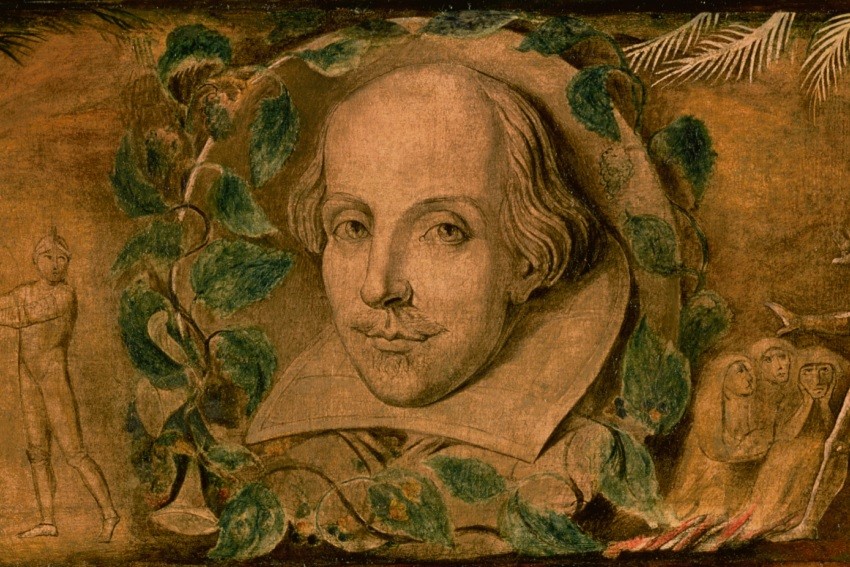The Death of Shakespeare

Shakespeare shuffled off this mortal coil 400 years ago – but will he ever really die?
Four centuries ago, a man died. Known as “Shakspere” to the Oxford English Dictionary until 1989, and often rendered “Willm Shaksp” by his own hand, this man was the Bard of Avon, William Shakespeare. Through rigorous scholarship (and the efforts of a few batty enthusiasts) we know when this man avoided his taxes, and how many words to which he inventively added the prefix ‘un’ (314). We know where he lived and when he moved; we know the names and ages of his wife and his children – even poor Hamnet, dead at 11. Records that survived the Great Fire of London and the passage of time tell us so much – much more than we know about many of Shakespeare’s worthy contemporaries. Meticulous research accounts for how we know so much about Shakespeare – the real question is why? Shakespeare swoops out of history like a literary Steven Bradbury. How did his works eclipse those of Ben Jonson, when the other was so much more famous? Why does Shakespeare capture our hearts today, when Sir Philip Sidney was far more beloved in life? How did this reasonably popular, fairly successful, moderately wealthy playwright come to outshine all other British writers? Part of the answer is found in Shakespeare’s life – his acting troupe enjoyed the patronage of King James I; they toured Britain often, as theatres in London were regularly closed due to outbreaks of plague; he refashioned others’ stories into exciting new plays (Othello, Romeo and Juliet, King Lear, As You Like It); and, most plainly, he wrote brilliantly. But then, on April 23, 1616, Shakespeare died. “At the time that he died, there was actual silence. It’s that silence that intrigues me,” Emeritus Professor Ian Donaldson, a distinguished scholar of Shakespeare and the world’s leading expert on Ben Jonson, tells The Adelaide Review. “There is no recorded mention by any of his contemporaries of the fact that he had died. There are no tributary poems. He was buried in Holy Trinity Church in Stratford a couple of days after his death, and he seems to have been buried there in the main chancel of the church because he was a worthy citizen of Stratford, rather than because he had a reputation elsewhere.” Only after death did Shakespeare begin the slow ascent to stardom. “There’s a temptation to read back from Shakespeare’s present fame and assume that’s how he was always regarded,” says Donaldson. “It’s assumed that he was the dominant and defining figure of his age – but there were other figures around or recently dead who were really regarded by many good judges as the top dogs, the best writers.” The dominance that Shakespeare enjoys today is not necessarily a good thing, either. Gary Taylor, a renowned scholar of Renaissance literature, has dedicated much of his life to researching Shakespeare and Thomas Middleton. Middleton was another Jacobean playwright who, like Ben Jonson, was far more famous than Shakespeare in life. Taylor believes academic and cultural feedback loops have led to – and will continue to enforce – Shakespeare’s immortal glory. In 1993, Taylor took a swipe at scholars and publishers for continuing to fiddle with Shakespeare at the expense of other writers. “Because the number of editions of a work is taken as a rough but visible measure of cultural value, the Shakespearean editorial population boom, by increasing the disparity between Shakespeare and other Renaissance playwrights, increases the apparent superiority of Shakespeare, and so makes potential editors less willing to devote their energies to ‘unimportant’ writers,” raged Taylor. “This cycle feeds another; given the resulting economies of scale, editions of Shakespeare tend to be cheap, editions of other playwrights expensive. This cycle feeds another; given the resulting availability of affordable texts, it is not only easy to teach Shakespeare, but possible to teach him flexibly.” These and further incentives encourage scholars, teachers and publishers to focus intently on Shakespeare, and so we are doomed to lose the historical and literary texture that study of other writers could provide. But these other writers may have doomed themselves – without them, we might never have known of Shakespeare at all. Seven years after Shakespeare’s death, John Heminges and Henry Condell painstakingly pieced together his First Folio, which guaranteed the survival of 18 plays. Subsequent editions of this posthumous collection featured heartfelt tributes from Ben Jonson and John Milton (this was, in fact, Milton’s first published poem). Jonson, somewhat unfairly remembered now as Shakespeare’s critic, became one of Shakespeare’s most ardent champions. “He recognised that [Shakespeare] was not just a pleasant writer, not just an admirable writer, but an astonishing writer, that Shakespeare was a phenomenon,” says Donaldson. Jonson identified the eternal quality of Shakespeare’s work, and in final tribute he proclaimed: Triumph, my Britain, thou hast one to show / To whom all Scenes of Europe homage owe. / He was not of an age, but for all time! Ian Donaldson will join Professor Ian Gadd and Dr Lucy Potter at Elder Hall for a free public lecture held in celebration of the 400th anniversary of Shakespeare’s death. Musical performance by Adelaide Baroque. The Death of Shakespeare Tuesday, April 26, 6pm Elder Hall adelaide.edu.au/eucentre/